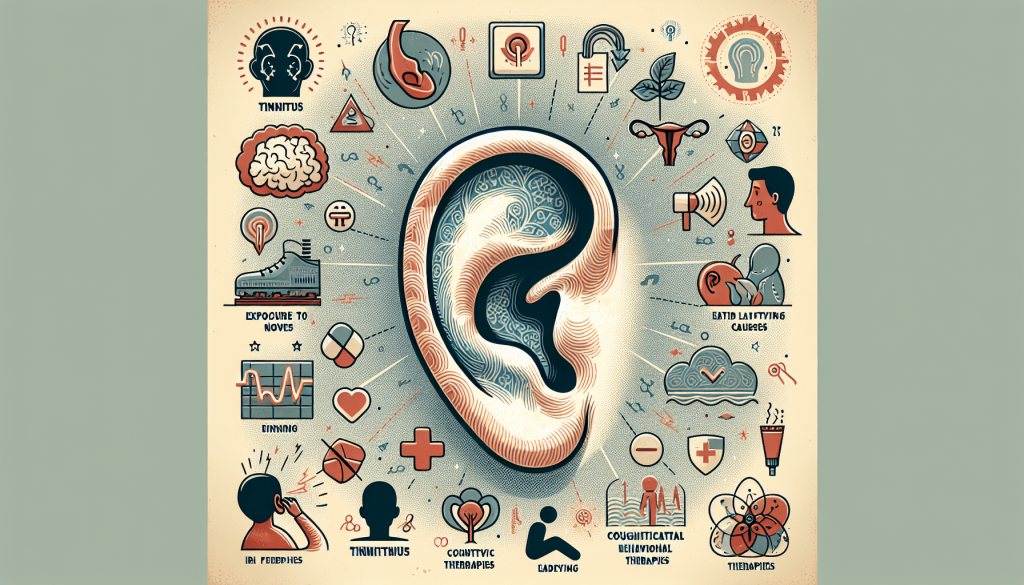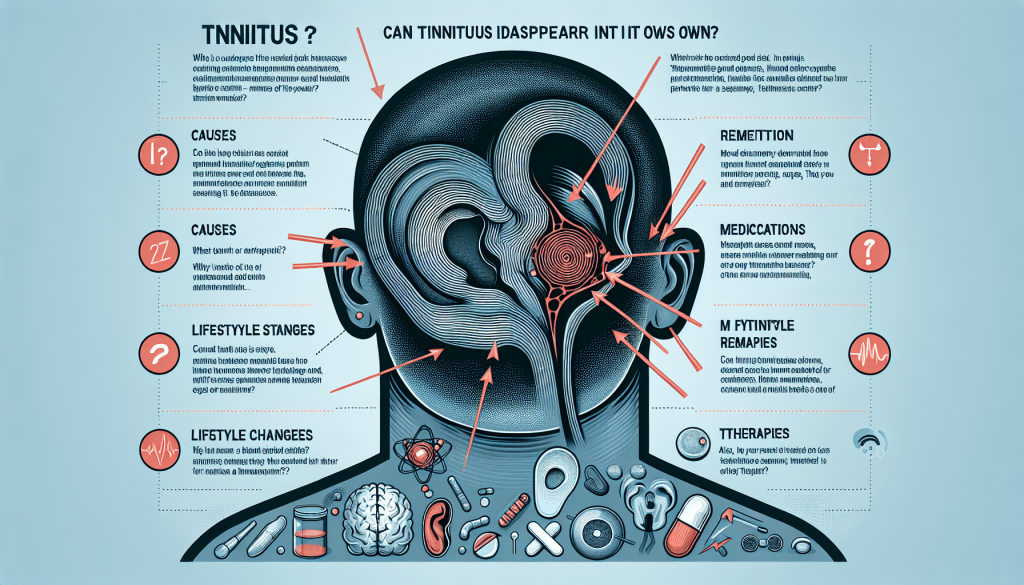Can Tinnitus Go Away?
Have you ever wondered if tinnitus, that persistent ringing or buzzing sound in your ears, can actually go away? Well, the good news is that it is indeed possible! For those who have been living with tinnitus, there may be hope for relief. This article explores the possibility of tinnitus disappearing on its own and provides insights into potential treatments that may help alleviate its symptoms. So, if you’ve been wondering about the fate of that bothersome ringing, keep reading to discover the possibilities that lie ahead.
Overview of Tinnitus
Definition of tinnitus
Tinnitus is the perception of sound in the ears or head without any external source. It is often described as a ringing, buzzing, hissing, or clicking noise. While many people experience occasional ringing in their ears, tinnitus becomes a concern when it persists and affects daily life.
Causes of tinnitus
Tinnitus can have various causes, including exposure to loud noises, age-related hearing loss, earwax blockage, certain medications, and medical conditions such as hypertension, ear infections, or temporomandibular joint disorders (TMJ).
Types of tinnitus
There are two primary types of tinnitus: subjective and objective. Subjective tinnitus is the most common and is only heard by the person experiencing it. Objective tinnitus, on the other hand, can be heard by both the person affected and a healthcare professional, as it is caused by a physical condition such as muscle spasms or a blood vessel disorder.
Can Tinnitus Go Away Naturally?
Temporary vs. chronic tinnitus
Tinnitus can occur temporarily, typically after exposure to loud sounds or during an ear infection, and may resolve on its own within a few days or weeks. However, chronic tinnitus is persistent and lasts for more than six months, often necessitating medical intervention.
Factors that affect the duration of tinnitus
Several factors influence the duration of tinnitus. The severity of the underlying cause, individual susceptibility, and level of noise exposure can all impact how long tinnitus lasts.
Spontaneous remission of tinnitus
In some cases, tinnitus can go away naturally without any specific treatment. This spontaneous remission can occur due to various reasons, such as the resolution of an ear infection or the body’s natural healing process. However, it is important to consult a healthcare professional for an accurate diagnosis and appropriate management.

Seeking Medical Intervention
When to consult a healthcare professional
It is advisable to seek medical intervention if tinnitus persists for more than a week, is accompanied by dizziness or hearing loss, or if it significantly affects daily life and mental well-being. Consulting a healthcare professional can help identify the underlying cause of tinnitus and determine the most appropriate treatment approach.
Diagnostic tests for tinnitus
To diagnose tinnitus, healthcare professionals may perform a thorough medical history review, physical examination, and hearing tests. Additional tests, such as imaging studies or blood tests, may be ordered if an underlying medical condition is suspected.
Treatment options for tinnitus
Treatment approaches for tinnitus aim to manage the symptoms and address any underlying causes. Depending on the severity and underlying cause, treatment options may include medication, hearing aids, sound therapy, cognitive behavioral therapy (CBT), or surgical intervention in rare cases.
Management Techniques
Sound therapy
Sound therapy involves using external sounds to mask or distract from the perception of tinnitus. This can be achieved through white noise machines, wearable devices that play soothing sounds, or even everyday ambient noises like a fan or soft music. Sound therapy can help reduce the prominence of tinnitus and provide relief for some individuals.
Tinnitus retraining therapy
Tinnitus retraining therapy (TRT) is a comprehensive approach that combines sound therapy and counseling. It aims to retrain the brain’s response to tinnitus, helping individuals habituate to the sound and reduce distress. TRT involves long-term management and typically requires the guidance of an audiologist or specialized healthcare professional.
Cognitive behavioral therapy
Cognitive behavioral therapy (CBT) is a psychological treatment that focuses on changing negative thoughts, emotions, and behavioral patterns associated with tinnitus. It aims to help individuals develop coping strategies, improve sleep quality, and reduce stress and anxiety related to their condition.
Relaxation techniques
Relaxation techniques such as deep breathing, meditation, yoga, and progressive muscle relaxation can help decrease the impact of tinnitus on overall well-being. These techniques promote relaxation, reduce stress and anxiety, and improve sleep quality, allowing individuals to better cope with tinnitus.

Alternative Remedies and Coping Strategies
Herbal supplements
Some individuals explore the use of herbal supplements such as ginkgo biloba, zinc, or B vitamins to alleviate tinnitus symptoms. While these supplements may provide relief for some, scientific evidence supporting their effectiveness is limited. It is crucial to consult with a healthcare professional before initiating any herbal treatments, as they may interact with other medications or have potential side effects.
Acupuncture
Acupuncture, an ancient Chinese practice, involves inserting thin needles into specific points of the body. Some people find acupuncture helpful in managing tinnitus symptoms, although scientific evidence regarding its effectiveness is inconclusive. Like with any alternative therapy, it is essential to consult with a qualified acupuncturist and inform them about your tinnitus before undergoing treatment.
Massage therapy
Massage therapy, particularly neck and shoulder massages, can promote relaxation and alleviate muscle tension, potentially providing relief from tinnitus-related symptoms. While it may not directly address the underlying causes of tinnitus, massage therapy can contribute to overall well-being and help manage stress associated with the condition.
Stress management
Stress can exacerbate tinnitus symptoms, so implementing stress management techniques is important. This can include engaging in regular physical activity, practicing mindfulness, getting adequate sleep, and seeking support from friends, family, or support groups. Stress reduction can positively impact tinnitus management and overall quality of life.
Living with Tinnitus
Support groups
Joining support groups or online communities can provide individuals with tinnitus an opportunity to connect with others who understand their experience. Hearing the stories and coping strategies of fellow tinnitus sufferers can offer support, validation, and practical advice for managing the condition.
Educational resources
Numerous educational resources are available to help individuals understand tinnitus better and learn about available management strategies. Websites, books, podcasts, and educational videos can provide valuable information on the latest research, coping techniques, and treatment options, empowering individuals to take an active role in managing their tinnitus.
Healthy lifestyle choices
Maintaining a healthy lifestyle can positively impact tinnitus management. Regular exercise, a balanced diet, adequate sleep, and reducing alcohol and caffeine consumption can contribute to overall well-being and potentially reduce the severity of tinnitus symptoms. It is important to consult with a healthcare professional for personalized recommendations.
Prognosis and Outlook
Factors influencing the prognosis
The prognosis of tinnitus varies depending on the underlying cause, individual response to treatment, and the presence of any coexisting medical conditions. Tinnitus caused by reversible factors, such as medication or earwax blockage, may resolve completely once the underlying cause is addressed. However, chronic tinnitus may require ongoing management, and the goal is often symptom reduction rather than a complete cure.
Long-term effects of tinnitus
While tinnitus itself is not considered a life-threatening condition, its presence can significantly impact an individual’s quality of life. Persistent tinnitus can cause emotional distress, sleep disturbances, difficulty concentrating, and even lead to anxiety or depression in some cases. Seeking appropriate management strategies is essential to minimize the long-term effects of tinnitus on mental and emotional well-being.
Finding hope and managing expectations
Living with tinnitus can be challenging, but it is important to stay positive and hopeful. Each individual’s experience with tinnitus is unique, and while there may not be a universal cure, there are various management approaches to explore. Working closely with healthcare professionals, adopting coping strategies, and finding support can greatly improve one’s outlook and ability to effectively manage tinnitus.
Prevention of Tinnitus
Protecting your ears
Taking measures to protect your ears from loud noises is crucial in preventing tinnitus. When in noisy environments, wearing earplugs or earmuffs can help reduce the risk of noise-induced tinnitus. Additionally, maintaining a safe listening volume when using headphones or attending concerts can go a long way in protecting your hearing.
Avoiding loud noises
Avoiding exposure to excessively loud noises whenever possible can significantly reduce the risk of developing tinnitus. This includes minimizing time spent in environments with high noise levels, such as construction sites or music concerts. Being conscious of noise levels and taking appropriate precautions is a proactive step in preventing tinnitus.
Limiting exposure to ototoxic substances
Certain medications and chemicals can harm the auditory system and potentially contribute to tinnitus. It is important to follow prescribed medication instructions and inform healthcare professionals about any existing hearing issues. Additionally, limiting exposure to ototoxic substances, such as certain solvents or chemicals, can help protect against tinnitus.
Research and Advancements
Current studies on tinnitus
Ongoing research on tinnitus aims to uncover more about its causes, mechanisms, and potential treatment options. Scientists are investigating neuroplasticity, the role of inflammation, and the impact of stress on tinnitus, among other areas of interest. Understanding the underlying mechanisms of tinnitus can lead to the development of more targeted therapies in the future.
Emerging treatment approaches
In recent years, new treatment approaches have emerged, offering hope for tinnitus sufferers. These include techniques like transcranial magnetic stimulation (TMS), electrical stimulation, and even drug therapies targeting specific neurotransmitter systems. While these approaches are still undergoing clinical trials and may not yet be widely available, they represent potential future options for tinnitus management.
Technology advancements
Advancements in technology have led to the development of wearable devices and smartphone applications designed to assist individuals with tinnitus. These devices can provide customized sound therapy, track tinnitus symptoms, and offer relaxation exercises, empowering individuals to take an active role in their tinnitus management. As technology continues to evolve, more innovative solutions may emerge.
Conclusion
The complex nature of tinnitus
Tinnitus is a complex condition with various underlying causes and individual experiences. It can range from a temporary annoyance to a chronic condition that significantly impacts an individual’s daily life. Understanding the multifaceted nature of tinnitus is key to finding appropriate management strategies that work best for each individual.
The importance of individualized management
Given the diverse range of causes and presentations of tinnitus, there is no one-size-fits-all approach to management. Consultation with healthcare professionals, such as audiologists, otolaryngologists, or specialized tinnitus clinics, is crucial to develop a personalized management plan tailored to individual needs and circumstances.
Hope for tinnitus sufferers
While tinnitus can be distressing, it is important to remain hopeful and optimistic. Advances in research, emerging treatment approaches, and the availability of various management techniques offer hope for tinnitus sufferers. By actively exploring different options and seeking appropriate support, individuals with tinnitus can find relief, improve their quality of life, and effectively manage their condition.
Additional Resources
If you’ve experienced that awful ringing in your ears, you know how bad it can get. It’s enough to drive a sane man berserk…
But here’s the thing – some people seem to have a natural immunity to tinnitus, while others suffer from it constantly. Fortunately, there is a way to trigger this immunity even if you aren’t naturally born with it.
The so-called hidden tinnitus immunity can be activated in a few days, using a simple but effective trick that you can do at home.
For more information, click: https://bit.ly/New-Tinnitus-Treatment







